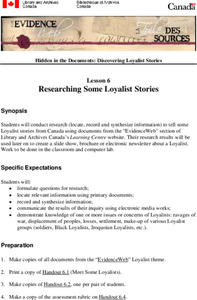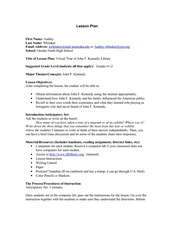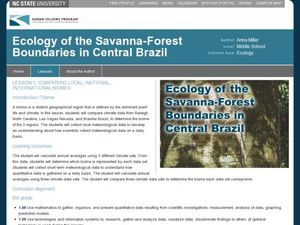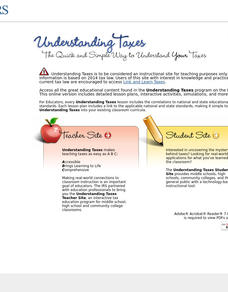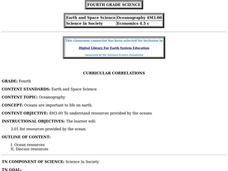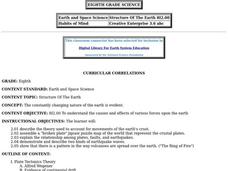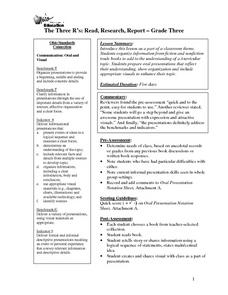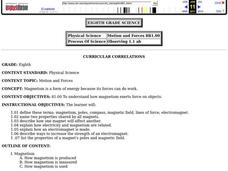Curated OER
Transpiration
Students interactively explore the term transpiration. In this science/ecology lesson, students discuss what they would do if they were thirsty while conducting research in Brazil. Additionally, students write descriptive words to...
Curated OER
Researching Some Loyalist Stories
Middle schoolers use electronic media to research Loyalist stories from Canada. They use the research to create a brochure, slide show, or electronic newsletter.
Curated OER
Middleton/Kuna History Teleconference
Third graders study the history and building of Middleton and Kuna. They create timelines of significant events in the towns' histories. Finally, they create a website dealing with Middleton and Kuna history.
Curated OER
Energy and the Environment
Fifth graders define alternative energy form, design models which show how the energy source can be used, and explain the purpose of dams.
Curated OER
Animals
First graders study the basic needs of animals and compare them to human needs. They make bird feeders using milk carton and pine cones. They review the basic needs of food, water, air, and shelter and discuss what happens when animals...
Curated OER
Bubble and Squeak
Students complete a unit on the chemical and technological processes of food preparation. They observe various experiments, describe changes in materials through cooking, identify safety and hygiene issues, and cook various recipes.
Curated OER
Environmental Education (Grade 4 - Lesson 2)
Fourth graders discuss ways in which the environment is helpful to humans. They discover how their actions affect the environment. They identify how animals and humans are subjected to the same environmental conditions.
Curated OER
Fossil Fuels
Fifth graders explore the use of fossil fuels and relate it to effects on the environment.
Curated OER
Writing a Children's Book -- Young Authors
High schoolers practice their writing skills by creating a children's book. They integrate five elements of short stories into the narrative. They share their stories with their book buddies.
Curated OER
Discovering My Family History
Students research their family trees. They research Internet sites, conduct interviews and, when possible, access primary sources to compile information about their family's history. Students present their findings in a family tree.
Curated OER
Character Education Poster
Students participate in a class discussion about what makes a poster promote a message. They explore topics from character education and make a poster to define and promote a desirable character trait.
Curated OER
Reading the Newspaper
Students explore how to find needed information about community events, resources, and employment. Students identify headlines, datelines, and sections of the newspaper. They participate in a newspaper treasure hunt. Students read and...
Curated OER
Virtual Tour of John F. Kennedy Library
Students take a virtual tour of the John F. Kennedy Presidential Library. In this Kennedy presidency lesson, students access the library via the Internet and take notes on the experience. Students write essays using the information they...
Curated OER
Comparing Local, National, International Biomes
Students calculate averages of climate sets of data. In this ecology lesson, students analyze data to determine identity of a biome and collect meteorological data to understand process. Students also compare data sets.
Curated OER
Fairness in Taxes
Students identify and describe two criterion of tax fairness: benefits received and the ability to pay and distinguish between wealth and income as measures of ability to pay.
Curated OER
Oceanography
Fourth graders explore the importance of oceans in supporting life on earth and identify resources obtained from the ocean.
Curated OER
Structure of the Earth
Sixth graders investigate earthquakes and volcanoes. They demonstrate fault lines with a folded piece of paper, conduct an erosion experiment, and construct a volcano using clay, baking soda and vinegar.
Curated OER
Structure of the Earth
Eighth graders examine the forces that are constantly acting on the Earth. They describe the theory of tectonic plates and demonstrate the two kinds of earthquake waves. They also examine the role of volcanoes in the structure of the...
Curated OER
Read Research and Report
Third graders organize information from fiction and nonfiction trade books to add to the understanding of a /curricular topic. They prepare oral presentations that reflect their understanding, show organization and include appropriate...
Curated OER
Human Rights/Civil Rights
Students connect their examination of the novel Roll of Thunder, Hear My Cry to a historical and contemporary study of the issue of human rights and civil rights by creating a HyperStudio stack.
Curated OER
Researching an Author
Students research works by a contemporary author of their
choice, choosing one in particular upon which to focus, conducting research
relating to that work. They create a brochure utilizing Microsoft Publisher then share their brochure...
Curated OER
Who Sunk the Titanic
Students discuss possible reasons for the Titanic sinking. They are split into small groups to research a historical figure involved in the sinking of the Titanic. They formulate a way to prove their characters guilt or innocence....
Curated OER
Simple Machines
First graders discuss work, force, and energy. They study how work is done. Students discuss various types of work that are done. They act out how work is done. Student draw pictures of types of work they have done.
Curated OER
Motion and Forces
Eighth graders define the terms: magnetism, poles, compass, magnetic field, lines of force, electromagnet. They name two properties shared by all magnets and describe how one magnet will affect another.



